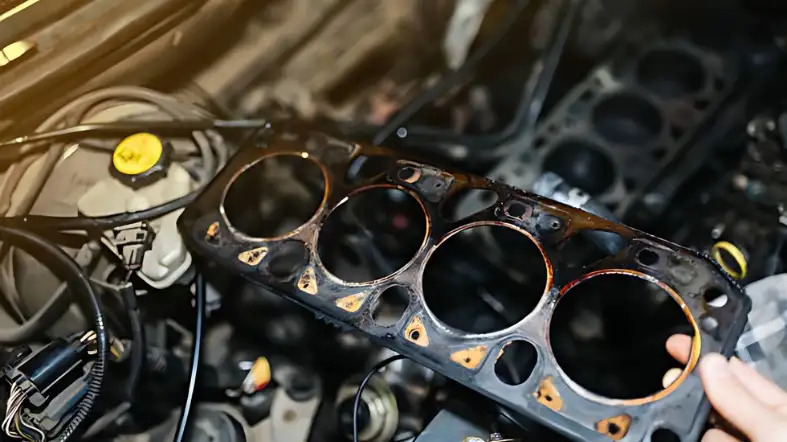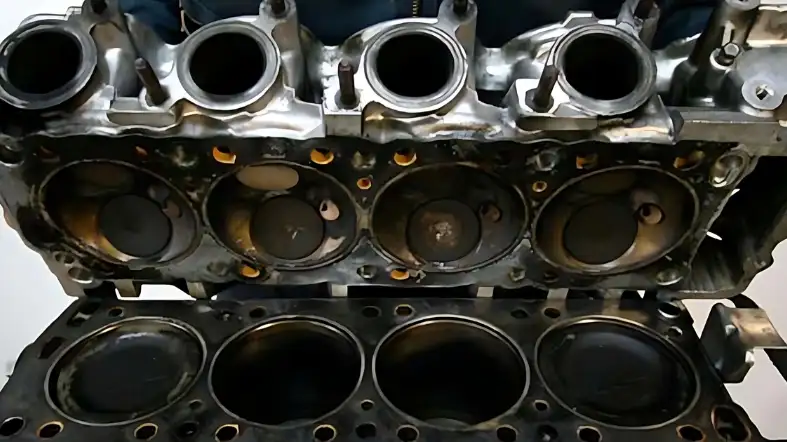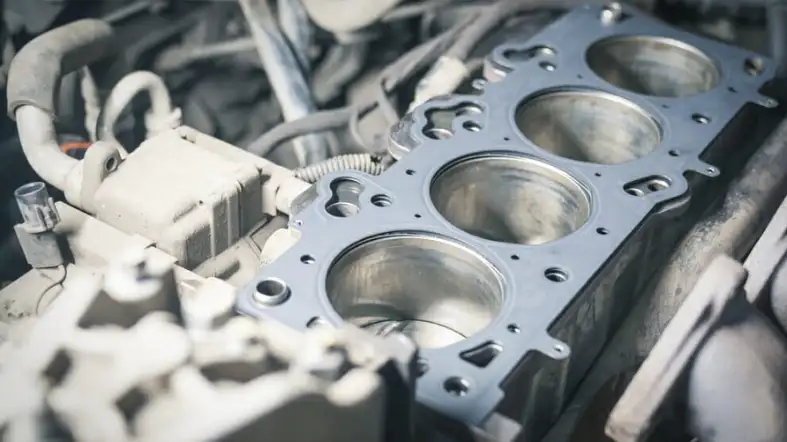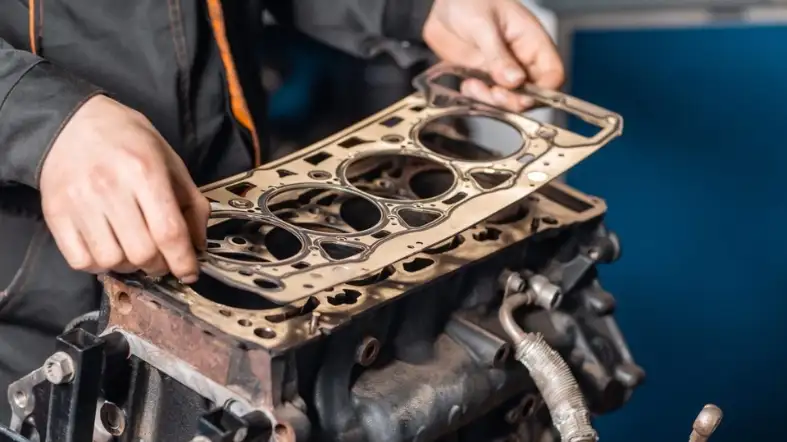When it comes to owning a vehicle, unexpected repairs are just part of the deal.
One common issue that can arise in a Dodge Ram 1500 is a blown head gasket.
In this post, we’ll explore the Dodge Ram 1500 head gasket replacement cost and what factors can influence it.
Dodge Ram 1500 Head Gasket Replacement Cost
On average, it can cost anyone $1,500 to $2,500.‘To avoid high repair costs in the future, we recommend regularly maintaining your vehicle.

For instance, you can change the oil, and monitor the cooling system. Don’t forget to keep an eye out for any fluid leaks or odd engine noises.
Head Gasket Replacement for Dodge Ram 1500: Is it Worth the Cost?
If your Dodge Ram 1500 is a newer model and you depend on it for work or transportation, then head gasket replacement may be worth the cost.
The cost of replacing the head gasket may not be worth it if your vehicle is older and has several other problems.
Tips for Saving Money on Dodge Ram 1500 Head Gasket Replacement Cost
Here are some tips for saving money on the head gasket replacement process:
Compare repair costs:
When faced with the need for a head gasket replacement on your Dodge Ram 1500, it’s essential to compare repair costs from different mechanics or repair shops.
Prices can vary significantly, and by getting multiple quotes, you can identify the most cost-effective option without compromising on quality.
Take your time to research and gather estimates from reputable service providers in your area.
Buy your parts:
One effective way to save money on the head gasket replacement process is by purchasing the required parts yourself.
Online retailers like American Trucks often offer a broad selection of gaskets and seals that can be used for head gasket replacement.
Buying the parts separately can potentially save you money compared to getting them through a mechanic or repair shop.
However, always ensure that the parts you choose are recommended by the manufacturer or compatible with your Dodge Ram 1500’s specific model and year.
Select Quality Gaskets and Seals:
While seeking ways to save money, it’s crucial not to compromise on the quality of the gaskets and seals.
Opting for cheap or substandard parts can lead to premature failure and further expenses down the road.
Look for reputable brands and products that offer a balance between affordability and reliability.
Using high-quality gaskets and seals can significantly improve the longevity and performance of the repair.
Use a gasket sealant:
To further enhance the effectiveness of the head gasket replacement, consider using a gasket sealant.
Applying a suitable gasket sealant can help reduce the risk of leaks and prevent future gasket failure.
Make sure to follow the manufacturer’s guidelines and use the recommended amount of sealant to ensure proper sealing without causing any adverse effects.
Perform routine maintenance:
Proper and timely maintenance of your Dodge Ram 1500 can go a long way in extending the life of your engine and reducing the chances of costly repairs, including head gasket replacements.
Regularly perform oil changes, coolant flushes, and other scheduled maintenance tasks as per the manufacturer’s recommendations.
Adequate maintenance can help detect and address potential issues early on, preventing them from escalating into more significant problems.
How to Know When It’s Time to Replace the Head Gasket on Your Dodge Ram 1500

If you are wondering about the signs of a blown head gasket in a Dodge Ram 1500, there are several common symptoms to be aware of:
External oil or coolant leak
An external oil or coolant leak may be visible at the seam between the engine block and cylinder head.
You might notice drops or puddles of fluid underneath the vehicle or stains and buildup around the engine.
These leaks can be an indication that the head gasket has failed and is allowing the fluids to escape.
Engine overheating
A blown head gasket can cause engine overheating.
Coolant may leak out of the gasket and into the engine, leading to a decrease in the cooling system’s efficiency.
This can be accompanied by a warning light on the dashboard or an unusually high-temperature gauge reading.
If you notice your engine temperature rising abnormally, it could be a sign of a head gasket problem.
White Smoke
If you observe white smoke coming from the tailpipe, it could be a sign of a blown head gasket.
This occurs when coolant leaks into the combustion chamber and gets burned along with the fuel.
The combustion of coolant produces white smoke, and you may also detect a sweet smell, similar to antifreeze.
Milky or frothy oil
A leaking head gasket can cause coolant to mix with the engine oil, resulting in a milky or frothy appearance.
You may notice this on the underside of the oil filler cap or when checking the oil level with the dipstick.
The presence of coolant in the engine oil can reduce its effectiveness as a lubricant, potentially causing damage to the engine.
Coolant in the engine oil
When coolant mixes with the engine oil, it affects the oil’s properties and can lead to a milky appearance.
Checking the oil level and quality can help identify if coolant has contaminated the engine oil.
Loss of power or misfiring
A blown head gasket can lead to a loss of power or misfiring in the engine.
The compromised gasket can result in low compression or combustion issues, affecting the engine’s performance.
This may manifest as a lack of acceleration, difficulty starting the engine, or rough idling.
Bubbles forming in the radiator
If you notice bubbles forming in the radiator or coolant reservoir, it could indicate that exhaust gases are leaking into the cooling system due to a blown head gasket.
The presence of these gases can disrupt the cooling system’s functionality and lead to overheating.
Engine smoke
A blown head gasket can cause engine smoke, which occurs when exhaust fumes leak through the crack in the engine block instead of being properly routed through the exhaust system and out the tailpipe.
Engine smoke is a serious issue that requires immediate attention as it can be harmful to both the vehicle and the environment.
The Pros and Cons of DIY Dodge Ram 1500 Head Gasket Replacement

Pros:
Cost savings:
Buyers have to pay different amounts depending on the make and model of their vehicle, But in general, the repair is more on the expensive side.
By doing the work yourself, you can save on labor costs, which can range from $550 to $693, according to RepairPal.
Additionally, buying a kit can cost around $75 for the bargain brand and up to $150 for high-quality brands like Fel-Pro or Mopar.
These prices do not include the necessary new head bolts, which can add additional costs.
Control over the repair process:
When you are leading the work you have more control over the repair process. You can be assured that everything is done to your specifications.
Learning experience: Undertaking a DIY head gasket replacement can be a great opportunity to learn more about your vehicle’s engine and mechanics.
It can be a satisfying and rewarding experience to successfully complete a complex repair like this.
Cons:
Risk of additional damage:
Undertaking a complex repair like a head gasket replacement can be risky if you don’t have the necessary skills and experience.
Lack of warranty:
DIY repairs don’t come with a warranty, as they do with professional repairs. Therefore, if anything goes wrong, you’re responsible for any repairs.
How to Prevent Dodge Ram 1500 Head Gasket Failure and Costly Repairs

Here are some tips to prevent head gasket failure in a Dodge Ram 1500.
Regular Maintenance:
Regular maintenance is key to preventing head gasket failure in any vehicle, including the Dodge Ram 1500.
It is crucial to follow the manufacturer’s recommended maintenance schedule, which includes regular oil changes, coolant flushes, and inspections.
By maintaining the engine regularly, you minimize the risk of overheating and other problems that can damage the head gasket.
Use High-Quality Coolant:
Using high-quality coolant is essential to prevent head gasket failure in a Dodge Ram 1500.
The coolant helps regulate the engine’s temperature and prevents it from overheating, which can cause the head gasket to fail.
Using the recommended coolant and replacing it regularly ensures that the engine stays cool and reduces the risk of head gasket failure.
Avoid Overheating:
The Dodge Ram 1500 is prone to head gasket failure due to overheating.
Overheating can cause the head gasket to fail, leading to significant engine damage.
Use High-Quality Engine Oil:
Using high-quality engine oil is essential to prevent head gasket failure in a Dodge Ram 1500.
The oil lubricates the engine and prevents it from overheating, which can cause the head gasket to fail.
Using the recommended oil and changing it regularly ensures that the engine stays lubricated and reduces the risk of head gasket failure.
Avoid Heavy Loads:
Towing and hauling heavy loads are the primary functions of the Dodge Ram 1500.
However, excessive weight can put a strain on the engine and increase the risk of head gasket failure.
It is essential to follow the manufacturer’s recommended weight limits and avoid overloading the vehicle.
Overloading the vehicle can cause the engine to overheat, leading to head gasket failure.
Frequently Asked Question
Q. What Is A Head Gasket In A Dodge Ram 1500, And Why Would It Need To Be Replaced?
A: A head gasket is a critical component in the engine of your Dodge Ram 1500 that sits between the engine block and cylinder head.
Its purpose is to seal the combustion chamber and keep oil and coolant from mixing.
The failure of this component can result in engine overheating, power loss, and potentially catastrophic engine damage.
Q. What Are Some Signs That My Dodge Ram 1500’S Head Gasket Needs To Be Replaced?
A: Some common signs of a failing head gasket in a Dodge Ram 1500 include engine overheating, coolant leaks, white smoke from the exhaust, loss of power, and a sweet smell coming from the exhaust.
Q. What Should I Look For In A Mechanic To Perform A Head Gasket Replacement On My Dodge Ram 1500?
A: When looking for a mechanic to perform a head gasket replacement on your Dodge Ram 1500, you want to make sure they have experience working on your specific vehicle and have a good reputation in the community.
It’s also a good idea to get multiple quotes from different mechanics to compare prices.
Q. How Can I Prevent Head Gasket Failure In My Dodge Ram 1500?
A: Regular maintenance, such as oil changes and coolant flushes, can help prevent head gasket failure in your Dodge Ram 1500.
Conclusion:
A blown head gasket in your Dodge Ram 1500 is a serious issue that needs to be addressed promptly.
Don’t hesitate to get an estimate from a trusted mechanic and prioritize the health of your engine.
